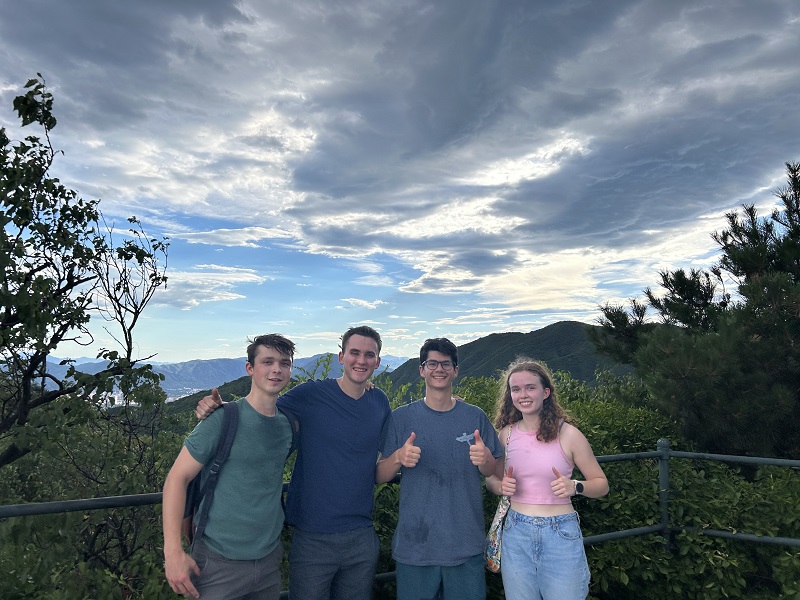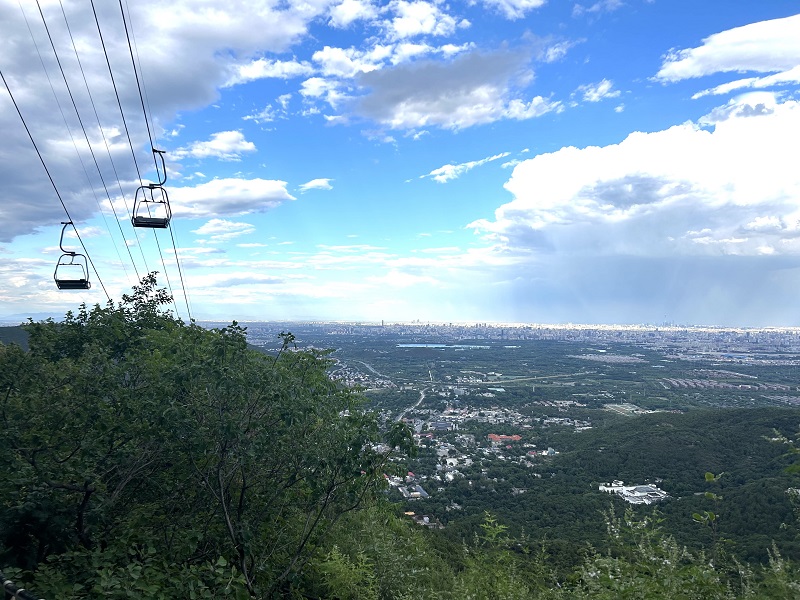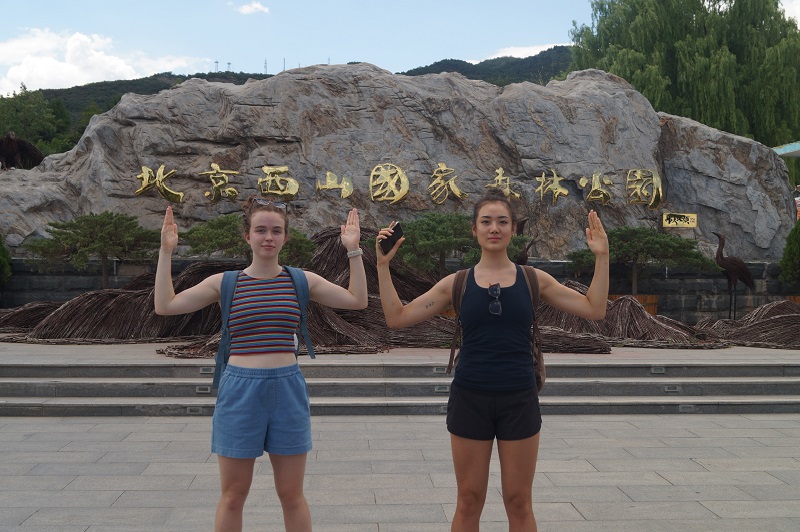[ad_1]
Written by Laura Romig (Brown College), Scholar Correspondent for CET Beijing, Summer time 2023
When a gaggle of classmates and I first encountered Beijing’s stunning pure panorama, it was by chance.
In Chinese language, there’s a phrase, 随便, with an extended listing of translations relying on its context—“informal,” “random,” “carelessly,” “to do as one pleases,” “to be free and simple”. 随便 carries each the damaging and optimistic connotations of randomness, generally that means careless, sure, but additionally generally implying spontaneous, and free.
In the meanwhile in Beijing, vacationer websites are booked full the second tickets are launched, and well-known museums teem with guests trying to find an air-conditioned oasis. In our efforts to see town within the time earlier than we return to the US, one resolution my classmates and I’ve concocted may very well be aptly described by this phrase, 随便. The steps are as follows: get on the subway, decide a vacation spot cease primarily at random, take the prepare to that cease, after which get off there to see what we will discover.
Final week, for instance, intrigued by a diffusion of inexperienced hills on the map, a number of classmates and I rode one subway line out to that final, and aptly named, cease, 香山, or “Aromatic Hills”. Simply past the subway station, we found a small neighborhood of properties and retailers, nestled under a series of dense, deep-green mountains. A skinny, serpentine highway uncurled uphill to the bottom of one of many mountains. As we walked, I noticed store doorways flung open proper onto the road—an artwork studio stacked with frames and wall hangings, a noodle store with tables spilling outward, and a bookshop with a shared studying house within the again.

My classmates and I (not dressed for a hike) on the high of 香山 after spontaneously deciding to climb the mountain on a Friday afternoon
From afar, the mountainous hills round Beijing ripple with seemingly infinite lush forest, darkish and deciduous and impenetrable. Up shut, on the high of that winding highway, we discovered entry to a climbing path that lower via the greenery and was dotted with seemingly miraculous temples and different constructions on the slopes all the way in which to the height, topped with an ancient-looking constructing that gazed over Beijing. Upon inspection of the inscription, we found it really had been inbuilt long-ago, unfathomable occasions—1983.
A gradual sloping path adopted by slim, steep stone stairs led us as much as this peak. On the path, the temperature dropped properly under the 100 levels Fahrenheit on the bottom in Beijing metropolis, which stretched out behind us as we walked. After I turned again, I might see the pinpoint needle of the CCTV tower, a brief stroll from our college. As I climbed step after step, nodding to fellow hikers and providing them a “加油” (“You are able to do it!” is perhaps a superb translation), I felt a hole inside me swell with a brand new fullness—from a careless subway trip, we had found the pure world in Beijing! And it was amazingly accessible. Nature, in Beijing, was the tip of a subway line. It was a tiny brown grasshopper, perched on my classmate’s thumb. It was turning round, exhausted and sweaty, then leaning in amazement in opposition to the handrail to see all the metropolis sprawled, its large buildings and lakes miniaturized to a scene I might cup between my two arms. It was briefly dropping the trail among the many timber. It was clear air, open skies, and the chirp of cicadas.

The view of Beijing from the Western Hills, with the Central Enterprise District skyscrapers far within the distance
That mountain hike helped me notice what had been lacking from my language classroom and metropolis streets expertise: a reference to nature. So the subsequent day, I went out with one other group of classmates, this time on the bus and with a plan, to 西山, one other set of mountain trails within the Western Hills. As we bussed again out to the mountains, a few of our fellow passengers, together with the bus security officer, struck up dialog with us, asking us about our impressions of China, our comparisons with America, our lives right here, our lives again house. We chatted, rubbed sunscreen on our faces, and sipped at water earlier than disembarking and getting down to climb the subsequent mountain.

A classmate and I imitating the Chinese language character for mountain, 山, on the base of ⻄山
As soon as I spotted nature in Beijing was as shut because the subway and bus traces, I began seeing connections with nature in all places I seemed. I thought of how 法源寺 (Fayuan Temple), the Buddhist temple tucked away in a Hutong that I had visited final week, was surrounded by and nearly immersed in timber; it was constructed to exist inside nature, somewhat than interrupting nature for the sake of human use. Branches had whispered with the breeze as we stepped between temple buildings, learn the inscriptions in historic Chinese language, and tried to make connections between the traditional and trendy writing techniques. I imagined that a number of the timber, essentially the most stable and regular, had witnessed the cautious carving of these unique historic characters. Now they watched us wander amongst them, guests from the world over, learning the identical language in its present kind.
Beijing can also be scattered with parks, a number of inside a stroll from our dorm. In summer time months, the lotus flowers 荷花 and 莲花 start to bloom, opening their aromatic petals for morning passerby earlier than retreating on the rise of evening. When my language associate Tang Hui had a free morning, she walked via a close-by park and snapped pictures of the pink blossoms amongst broad inexperienced leaves dotting the lake, messaging me the photographs over WeChat. Later, as we have been strolling and noticed a small lotus bloom on the college campus, she identified how the lotus root was the identical meals we had dropped within the boiling water at a Beijing hotpot joint the opposite week. The thread of nature, in fact, trickled all the way in which right down to the meals on our plates.
Even in our weekly CET-organized martial arts class, I discovered nature once I started to look. In my language class, the place we examine not solely language subjects however cultural ones as properly, our trainer had given an introductory clarification of the Chinese language faith and philosophy of Daoism. Its key rules, I realized, is perhaps translated as inaction, accordance with nature, and spontaneity. These rules are expressed in varied points of Chinese language tradition—for instance, within the follow of 太极, Tai Chi. The martial arts we’re studying, our teacher Li Ke has defined, is just like Tai Chi; we transfer in accordance with nature, with function, but additionally whereas letting the pure stream of the motion lead us ahead. We incorporate followers into the routine, which, after practising a number of occasions, nearly appear to open and shut on their very own, in accordance with the sense behind the actions. So even within the shadow of the bleachers, on the sun-browned college observe practising martial arts, I spotted there was a glimmer of the pure world for me to attach with.

CET classmates and language companions practising martial arts collectively
Our language courses train us vocabulary for speaking with native audio system, for debating options for US-China relations; our lecturers present us how one can write formally in Chinese language and browse information about inexperienced finance and worldwide coverage. They’ve additionally taught us about conventional Beijing tradition and structure, the influences of Confucianism on the schooling system and household buildings, and way more. Nevertheless, the expertise of learning overseas in Beijing, experiencing the language in real-time and in reference to my physique and thoughts, is what I consider has really made a distinction in my studying Chinese language. The fastidiously deliberate class periods construct us a rigorous construction, a framework for the language that’s immensely useful. However it’s the real-life experiences that sow life inside this framework and permit us to truly reside throughout the language.
The kind of expertise I’m describing—spontaneous, transferring freely via the world—may very well be described as 随便, as random and presumably careless. But it surely may be described as transferring in accordance with the character of the place you’re learning, the stream of its language, and possibly even in accordance with the pure world. As we have been climbing up that first mountain, chatting in Mandarin over the push of the wind, I spotted the place such experiences may lead me. I additionally realized how far I nonetheless should go in filling in that framework of residing in one other language. However—identical to the Beijing hills I’ve hiked to this point—that may be a mountain I’m excited to climb.
[ad_2]

